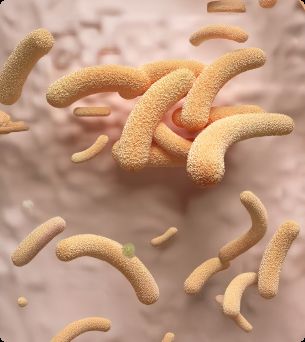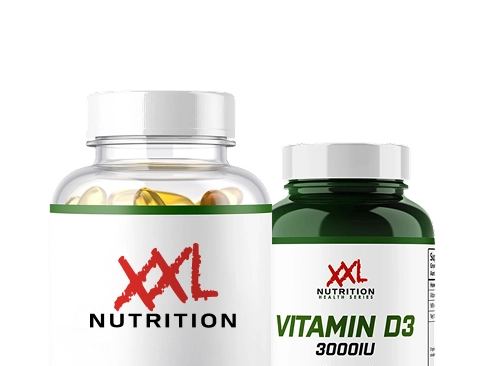Eating healthily, exercising enough, and still not losing weight? It can be frustrating when the pounds refuse to budge, even when you’re doing everything right. What is often overlooked is the role of your gut. Your gut health plays a crucial role in weight loss and maintaining a healthy weight. In this blog, we dive into the science behind gut health, obesity, and how you can use your microbiome to achieve lasting results.

What is the link between your intestines and your weight?
Your intestines contain trillions of bacteria that together form your microbiome. These bacteria not only help digest food, but also play a key role in your metabolism, immune system, and even your mood. A healthy balance in the microbiome is essential for a properly functioning body. But if that balance is disrupted—for example, by a poor diet, stress, or illness—it can lead to weight gain and other health problems.
How do your intestines affect weight loss?
1. Gut health and metabolism
Research has shown that gut bacteria play a crucial role in how your body processes nutrients and stores calories. Certain bacteria, such as Firmicutes, are known to extract more calories from food compared to other bacteria such as Bacteroidetes. A study published in Nature found that obese people often have a higher ratio of Firmicutes to Bacteroidetes, which contributes to increased fat storage and weight gain.


2. Leaky gut and inflammation
Leaky gut occurs when the intestinal wall becomes permeable, allowing harmful substances such as toxins and undigested food particles to enter the bloodstream. This causes inflammation, a major factor in chronic conditions such as obesity and insulin resistance. A study in Frontiers in Immunology links leaky gut syndrome to metabolic syndrome and increased fat storage.
3. Your intestines determine your hunger and satiety
The intestines communicate with the brain via the gut-brain axis, in which hormones such as ghrelin (hunger hormone) and leptin (satiety hormone) play a role. When intestinal health is compromised, this communication is disrupted. Unhealthy gut bacteria can, for example, increase ghrelin levels, leading to overeating. Research published in Cell Metabolism confirms that certain probiotic strains can restore this balance and improve appetite regulation.

4. The microbiome and fat storage
The composition of your gut microbiome has a significant impact on how your body stores fat. People with an unbalanced composition, such as an abundance of Firmicutes and a deficiency of Bacteroidetes, tend to store more fat. Studies also suggest that introducing prebiotics or probiotics can shift the balance toward a healthier microbiome and support weight loss. A review in the Journal of Nutrition discusses how dietary fiber can promote an intestinal environment that discourages fat storage.
What are common intestinal problems that cause weight gain?
- Dysbiosis
An imbalance between good and bad bacteria in the gut can lead to various symptoms, such as bloating, fatigue, and changes in bowel movements (e.g., diarrhea or constipation). This imbalance affects metabolism and can contribute to weight gain. According to a study on the health of the microbiome, such an imbalance can increase the absorption of fats and carbohydrates, resulting in greater fat storage.
- Leaky Gut
As mentioned earlier, leaky gut occurs when the intestinal wall becomes permeable. Symptoms include abdominal pain, food intolerances, and chronic fatigue. This condition causes inflammation that promotes metabolic disorders, such as insulin resistance. A study published in Frontiers in Immunology links this syndrome to obesity and metabolic syndrome.
- Overgrowth of bad bacteria
An increase in bad bacteria, such as in Small Intestinal Bacterial Overgrowth (SIBO), can lead to delayed digestion and bloating. This often results in increased fat storage. Symptoms of SIBO include bloating, gas, and diarrhea or constipation. According to a study in the American Journal of Gastroenterology, SIBO has a direct impact on weight.



- Candida overgrowth
An overgrowth of Candida yeast in the intestines can cause bloating, sugar cravings, and fatigue. Candida feeds on sugars, which can create a vicious cycle of weight gain. Studies show that this overgrowth also contributes to inflammation and insulin resistance.
- Constipation
Chronic constipation can lead to the accumulation of waste products and a slowed metabolism. This can also cause a feeling of fullness that appears to cause weight gain. Symptoms include fewer than three bowel movements per week, hard or lumpy stools, and a feeling of incomplete emptying.


- Lack of prebiotic fibers
A deficiency in prebiotics, which support the growth of healthy gut bacteria, can lead to an unbalanced microbiome. This affects energy metabolism and can contribute to fat storage. Symptoms include bloating, constipation, and a general decline in gut health.
How can you improve your gut health for weight loss?
1. Microbiome testing
At Easly, we offer advanced microbiome tests, such as the Microbiome Test and the Microbiome Test with Probiotics & Prebiotics. These tests provide in-depth insight into the composition and functionality of your gut microbiome. They help identify dominant bacterial species and possible imbalances. With this knowledge, you can apply scientifically based targeted interventions, such as personalized dietary adjustments and the use of specific supplements, to balance your microbiome and improve your overall health.
2. Nutrition for healthy intestines
What you eat has a direct impact on your gut health. Choose:
- Fermented foods: Think kefir, yogurt, kimchi, and sauerkraut.
- Prebiotic foods: Such as onions, garlic, bananas, and asparagus.
- Fiber-rich products: Whole grains, vegetables, and legumes feed the good bacteria in your gut.

3. Avoid triggers
- Processed foods and added sugars feed harmful bacteria.
- Artificial sweeteners can disrupt the balance in your microbiome.
4. Supplements and probiotics
- Probiotics: Research shows that certain strains, such as Lactobacillus gasseri, can aid weight loss.
- Prebiotics: These feed the good bacteria and stimulate their growth.
5. Healthy habits
- Exercise regularly: Exercise has a positive effect on your gut flora.
- Reduce stress: Stress affects your gut-brain axis and can throw your microbiome out of balance.
- Get enough sleep: A good night’s sleep is essential for healthy gut flora.




- Hydration is important: stay hydrated to support digestion and a healthy intestinal wall. Aim for 2 liters of water per day and try intestinal-soothing teas such as chamomile or peppermint.
- Mindful eating: eat slowly, chew thoroughly, and avoid distractions to improve digestion and prevent bloating.



What can you do today?
Start with a microbiome test to find out how healthy your gut is. Use the results to adjust your diet and lifestyle and address any imbalances. Supplement this with targeted supplements and gut-friendly foods to work toward a healthier, more balanced gut flora—and a healthier you.


Conclusion
Your gut plays a key role in weight loss. By working on a healthy microbiome, you can not only optimize your digestion and metabolism, but also reduce inflammation and lose weight for good.
Your gut is key to weight loss and overall health. By supporting a balanced microbiome, you can improve digestion, boost metabolism, reduce inflammation, and lose weight sustainably. Discover how gut health can transform your well-being and lay the foundation for a healthier, more energetic life.
Sources:
- National Library of Medicine — The Gut Microbiome and Its Role in ObesitySeksuele Klachten
- Sciencedirect — The links between gut microbiota and obesity and obesity related diseases
- Yale School of Medicine — Treating Obesity with Gut Microbiota
- Emory University — Scientists identify obesity-promoting metabolite from intestinal bacteria








